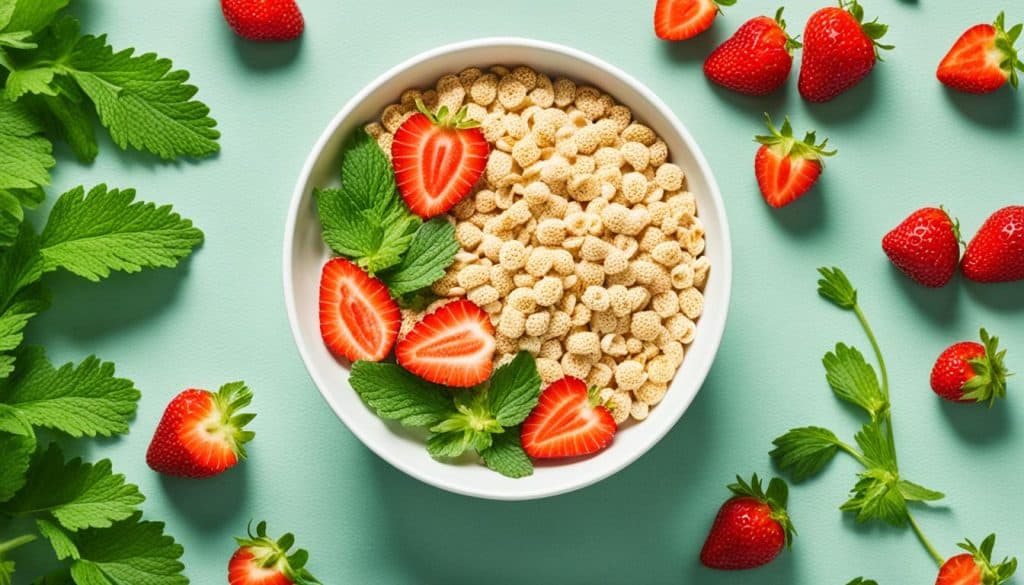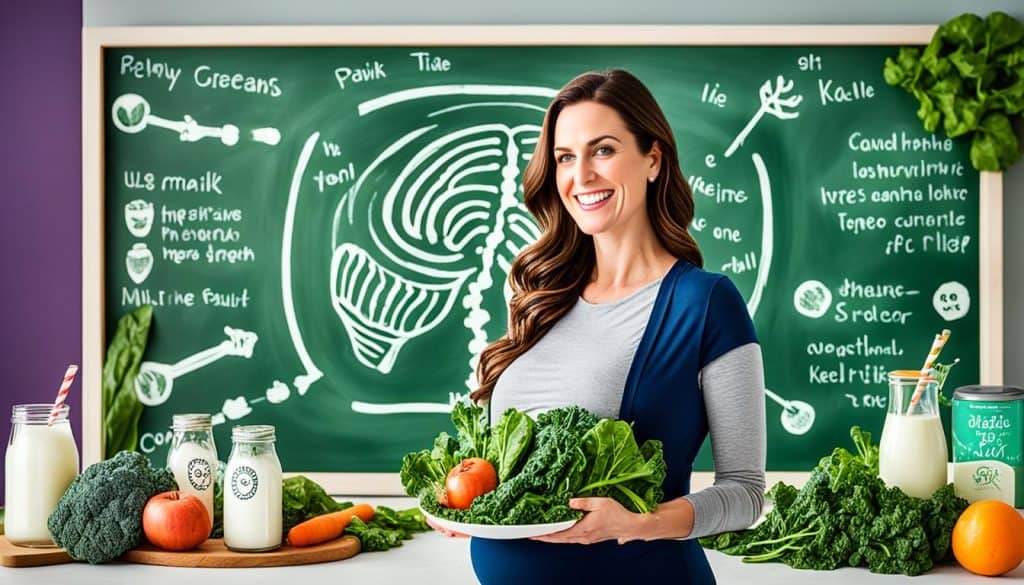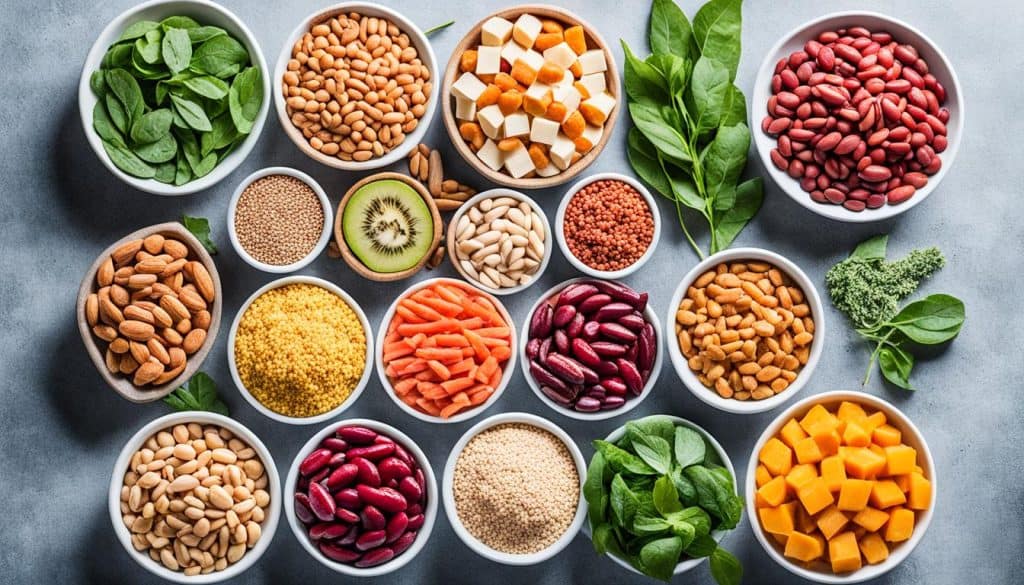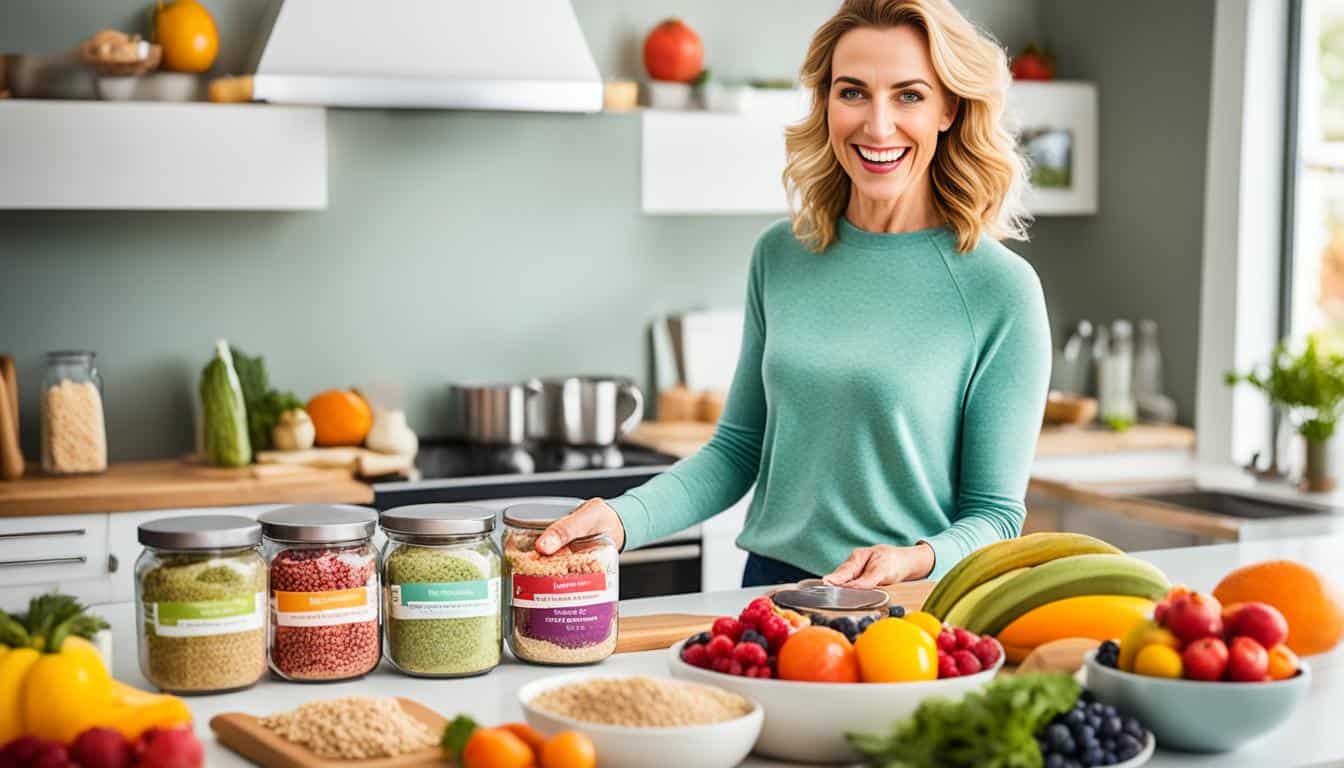During pregnancy, taking care of your nutrition is key for a healthy pregnancy and your baby’s growth. As an expectant mother, you want to make sure you’re giving your body the right nutrients. This helps support your baby’s growth and makes the pregnancy smoother.
Let me share a personal story with you. When I found out I was pregnant, I was filled with excitement and joy. But, I also felt a big responsibility to give my baby the best start. That’s when I started learning about prenatal nutrition.
I learned that eating right can greatly benefit my baby and my health. Folic acid is a key nutrient for your baby’s early development. It helps prevent neural tube defects. You should get 400 micrograms (mcg) a day before pregnancy and 600 to 1,000 mcg a day while pregnant.
But folic acid isn’t the only important nutrient. Calcium is vital for strong bones and teeth. Vitamin D supports the immune system. Protein is important for growth, and iron helps prevent anemia. These nutrients work together to help your baby develop properly.
With this knowledge, I started adding these nutrients to my meals. I planned my meals ahead, focusing on fresh fruits, veggies, whole grains, lean proteins, and dairy. I also found some tasty recipes made just for expectant mothers.
Key Takeaways:
- Ensure you’re getting enough folic acid to prevent neural tube defects.
- Include calcium, vitamin D, protein, and iron in your diet for the proper development of your baby.
- Plan your meals in advance and include fresh, nutritious ingredients.
- Explore healthy recipes tailored for expectant mothers.
- Remember, a prenatal supplement complements a healthy diet but does not replace it.
The Importance of Folate and Folic Acid in Prenatal Nutrition
Folate and folic acid are key for the health of moms-to-be and their babies. Folate is a B vitamin crucial for making new cells, DNA, RNA, red blood cells, and amino acids during pregnancy and after. It’s vital for the growth and development of the baby.
Folate is especially important in preventing serious birth defects like anencephaly and spina bifida. These affect the brain and spinal cord. Pregnant women should get 600 mcg DFE of folate daily. Breastfeeding moms should aim for 500 mcg DFE.
Eating foods high in folate is a great way to boost your intake. Spinach, kale, oranges, grapefruits, lentils, chickpeas, nuts, and beans are all good choices. Adding these to your meals helps meet your folate needs.
You can also get folic acid from fortified foods and supplements. Many cereals, breads, flours, pastas, rice, and cornmeal are fortified with folic acid. Check the labels for the amount of folic acid in mcg.
Some prenatal supplements also contain folic acid. Taking a 400 mcg supplement is advised for women who might become pregnant to lower the risk of birth defects. Always talk to a healthcare provider before starting any supplements.

The U.S. fortification program has greatly increased folic acid intake. It adds about 190 mcg/day through fortified foods. This has helped reduce the number of neural tube defects.
The Nutrition Facts label helps ensure you’re getting enough folate. It lists folate as mcg DFE and shows a %DV based on daily needs. Adults and kids over 4 need 400 mcg DFE daily. Folic acid is easier for the body to absorb than folate, which is why we use mcg DFE.
Key Takeaways:
- Folate, a B vitamin, is essential for prenatal nutrition.
- Folic acid is the synthetic form of folate and is commonly found in fortified foods and prenatal supplements.
- Folate helps lower the risk of neural tube defects in babies.
- Good sources of folate include dark green leafy vegetables, citrus fruits, legumes, and nuts.
- Fortified cereals and other fortified products provide additional folic acid.
- The fortification program in the United States has been successful in increasing folic acid intake and reducing the incidence of neural tube defects.
- It is important to meet the daily folate requirements through a combination of natural food sources and supplements as recommended by a healthcare provider.
Key Nutrients for Strong Bones and Teeth in Pregnancy
During pregnancy, it’s key to focus on building strong bones and teeth for both mom and baby. Calcium and vitamin D are two key nutrients that help with this.
Calcium is crucial for healthy bones and teeth. It also helps muscles, nerves, and the heart work right. Pregnant women should aim for 1,000 milligrams of calcium every day.
There are many ways to get calcium from food. Milk, yogurt, and cheese are great choices. They give you calcium and important nutrients like protein and vitamin D. Adding leafy greens like broccoli and kale to meals also helps with calcium.
Fortified juices and cereals are easy ways to boost calcium intake. These foods have extra calcium added to them. Adding them to a balanced diet helps pregnant women support their bone and teeth health.
Vitamin D helps calcium work better in the body. It supports bone strength and the immune system. Pregnant women should get 600 IU of vitamin D daily.
Fatty fish like salmon and tuna are good for vitamin D and omega-3 fatty acids. Dairy products and fortified cereals are also good for vitamin D. For vegetarians or vegans, fortified plant milks are a good choice.
Combining foods high in calcium with vitamin D sources is best for bone and teeth health in pregnancy. Eating these foods and possibly taking supplements, with a healthcare professional’s advice, helps build strong bones and teeth for mom and baby.

Regular dental check-ups and good oral hygiene are key for healthy teeth and gums during pregnancy. By eating the right nutrients, expectant mothers can help build strong bones and teeth for a lifetime of good oral health.
The Role of Protein in Supporting Growth During Pregnancy
Protein is key for your baby’s growth and development during pregnancy. It helps build new tissues and organs and makes enzymes and hormones.
It’s crucial to eat enough protein to help your baby grow healthy. Lean meats like chicken, fish, and turkey are great for protein. Seafood, eggs, beans, and lentils are also good choices. These foods give you protein and important vitamins and minerals for you and your baby.

Protein is made of amino acids, which are vital for your baby’s growth. They help build muscles, bones, and organs. Getting enough protein makes sure your baby gets the amino acids they need.
Studies show that protein supplements during pregnancy can help with birth weight and height. These supplements can increase birth weight by 95-324 grams and height by 4.6-6.1 millimeters. They also help reduce the number of low birth weight babies by 6%.
But, too much protein from supplements can be bad for your baby. It can cause problems and slow down growth. Always talk to your healthcare provider about how much protein you should eat.
The recommended amount of protein during pregnancy is 1.1 grams per kilogram of your pre-pregnancy weight in the second and third trimesters. In the first trimester, you don’t need extra protein. But, new studies suggest you might need more protein in the early and late stages of pregnancy.
The American Pregnancy Association says pregnant women should aim for 75-100 grams of protein a day. The Acceptable Daily Macronutrient Range (AMDR) recommends 10-35% of your daily calories come from protein. This depends on how many calories you eat.
Make sure you’re getting enough protein during pregnancy. Many pregnant women don’t get enough. Talking to a healthcare professional or dietitian can help you plan your diet right.
Protein is vital for your baby’s growth and health. Eating lean meats, poultry, seafood, eggs, beans, and lentils will give your baby the amino acids and nutrients they need.
Iron and Its Importance in Preventing Anemia During Pregnancy
Pregnancy increases the risk of iron deficiency anemia. This happens when the body lacks enough iron for healthy red blood cells. Symptoms include fatigue, weakness, dizziness, and pale skin. But, getting enough iron can prevent anemia and support the health of both mom and baby.
Iron is key for making hemoglobin, a protein in red blood cells that carries oxygen. Lean red meat, poultry, and fish are great iron sources for pregnant women. Adding iron-fortified cereals, dark leafy greens, legumes, and other iron-rich foods to your diet helps prevent anemia and boosts health.
Eating plant-based iron with foods or drinks high in vitamin C, like orange juice or strawberries, improves iron absorption. Prenatal vitamins with iron also help prevent and treat iron deficiency anemia during pregnancy. Pregnant women should aim for 27 milligrams of iron daily.
If pregnant women already take prenatal vitamins with iron but still feel anemic, they might need more iron or a doctor’s check-up. Sometimes, taking iron pills isn’t enough, and they might need iron through a vein. This is often the case for those who’ve had gastric bypass or small bowel surgery.


